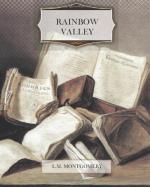The sun was setting over Rainbow Valley. The pond was wearing a wonderful tissue of purple and gold and green and crimson. A faint blue haze rested on the eastern hill, over which a great, pale, round moon was just floating up like a silver bubble.
They were all there, squatted in the little open glade—Faith and Una, Jerry and Carl, Jem and Walter, Nan and Di, and Mary Vance. They had been having a special celebration, for it would be Jem’s last evening in Rainbow Valley. On the morrow he would leave for Charlottetown to attend Queen’s Academy. Their charmed circle would be broken; and, in spite of the jollity of their little festival, there was a hint of sorrow in every gay young heart.
“See—there is a great golden palace over there in the sunset,” said Walter, pointing. “Look at the shining tower—and the crimson banners streaming from them. Perhaps a conqueror is riding home from battle—and they are hanging them out to do honour to him.”
“Oh, I wish we had the old days back again,” exclaimed Jem. “I’d love to be a soldier—a great, triumphant general. I’d give EVERYTHING to see a big battle.”
Well, Jem was to be a soldier and see a greater battle than had ever been fought in the world; but that was as yet far in the future; and the mother, whose first-born son he was, was wont to look on her boys and thank God that the “brave days of old,” which Jem longed for, were gone for ever, and that never would it be necessary for the sons of Canada to ride forth to battle “for the ashes of their fathers and the temples of their gods.”
The shadow of the Great Conflict had not yet made felt any forerunner of its chill. The lads who were to fight, and perhaps fall, on the fields of France and Flanders, Gallipoli and Palestine, were still roguish schoolboys with a fair life in prospect before them: the girls whose hearts were to be wrung were yet fair little maidens a-star with hopes and dreams.
Slowly the banners of the sunset city gave up their crimson and gold; slowly the conqueror’s pageant faded out. Twilight crept over the valley and the little group grew silent. Walter had been reading again that day in his beloved book of myths and he remembered how he had once fancied the Pied Piper coming down the valley on an evening just like this.
He began to speak dreamily, partly because he wanted to thrill his companions a little, partly because something apart from him seemed to be speaking through his lips.
“The Piper is coming nearer,” he said, “he is nearer than he was that evening I saw him before. His long, shadowy cloak is blowing around him. He pipes—he pipes—and we must follow—Jem and Carl and Jerry and I—round and round the world. Listen— listen—can’t you hear his wild music?”
The girls shivered.
“You know you’re only pretending,” protested Mary Vance, “and I wish you wouldn’t. You make it too real. I hate that old Piper of yours.”




